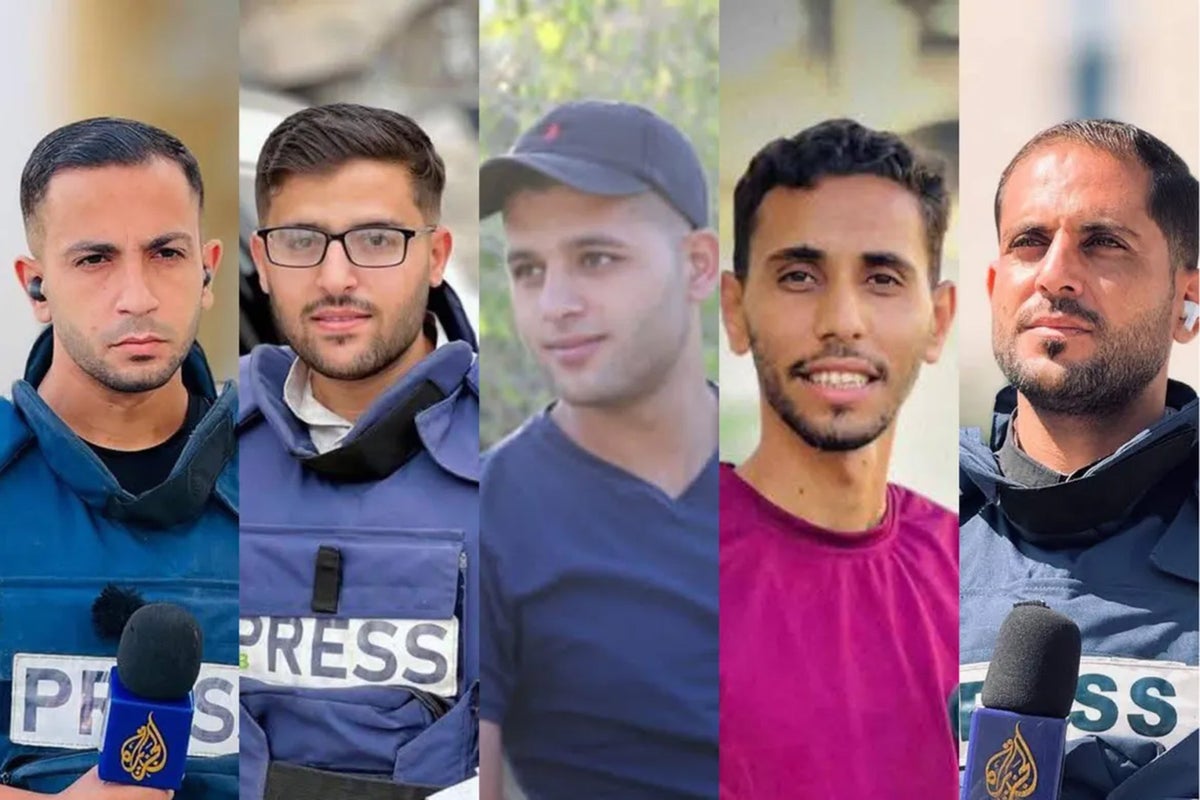Sheltering in tents on the grounds of the Shifa hospital complex in Gaza City, Al-Jazeera journalists had just bid each other good night.
Another day of reporting on the violence, starvation and brutality in their besieged homeland had ground to an end.
Fifteen minutes later, Israeli missiles tore through the sky and eviscerated the tent.
Anas Al-Sharif, 28, one of the news channel’s most prominent voices in Gaza, was killed alongside reporter Mohammed Qreiqeh, and cameramen Ibrahim Zaher, Mohammed Noufal and Moamen Aliwa. A sixth journalist, a freelance, was killed nearby.
Al-Sharif had been intentionally targeted by the Israelis, who accused him of being the head of a Hamas terror cell, but offered no credible evidence to back up their claim. There was no explanation for the killing of the other men alongside him.
Saed, a Palestinian journalist staying in a nearby tent on the same site, was thrown to the ground by the deafening explosion when the strike hit.
“I lost consciousness,” he told The Independent. “Suddenly, my eyes went back to the area, and I saw that the journalists’ tent had been targeted.”
Amer, 31, also in the same compound, came rushing out. He described seeing one journalist, injured in the legs and back, screaming for help.
Al-Sharif – who had face numerous death threats in the run up to the strikes – was lying dead on the ground behind him.
His colleague Mohammed Qraiqaa was alive, just about, but on fire. Those around him scrambled to try to extinguish the flames, Amer continued.
“One man was killed while sitting in a chair, and another was killed inside the journalist tent next to us. It was horrific,” he added, visibly shaken.
Shrapnel had sprayed the journalist syndicate tent, killing a sixth journalist who did not work for Al Jazeera, as well as a passer-by.
“These journalists were the voice and the image of our suffering here in Gaza — and now they have become the subject of the stories they were covering,” Amer said.
“Anas expected that he would be targeted at any moment. He accepted the possibility, based on the threats against him. He was reporting to the world what was happening, conveying the images and the massacres being committed in the Gaza Strip. There was no place for him to hide.”
Prepared for his death, a lengthy heartbreaking statement was posted to Al-Sharif’s X account after he was killed read: “This is my last will and testament. If these words of mine reach you, know that Israel has succeeded in killing me and silencing my voice.”
The message concluded: “Do not forget Gaza… And do not forget me in your sincere prayers for forgiveness and acceptance.” Shortly before his death, he posted that there was “non-stop bombing” in the area.
The Committee to Protect Journalists, CPJ, warned last month it was gravely concerned for Al-Sharif’s safety as he was being “targeted by an Israeli military smear campaign” and the unfounded accusations “represented an effort to manufacture consent to kill Al-Sharif”.
Sara Qudah, the group’s director for the Middle East and North Africa had said tat the time the two weeks ago danger to Al-Sharif’s life was “now acute”.
A UN expert previously warned that Al-Sharif’s life was in danger due to his reporting from Gaza, while special rapporteur Irene Khan said last month Israel’s claims against him were unsubstantiated.
Israeli military claimed responsibility for the attack claiming he was a Hamas militant who was responsible for coordinating rocket attacks.
Jodie Ginsberg, chief executive of CPJ, said they had yet to see “any credible evidence” to back the Israeli allegations against Al-Sharif.
“They’ve been making this claim for many, many months, most recently in the last couple of weeks following a report that Anas did on starvation in Gaza, in which he cried on air,” Ms Ginsberg said.
“We’ve asked for evidence repeatedly from Israel.”
The journalists’ deaths were roundly condemned across the world with Sir Keir Starmer’s spokesman saying the PM was “gravely concerned by the repeated targeting of journalists in Gaza”.
He went on: “Reporters covering conflicts are afforded protection under international humanitarian law, and journalists must be able to report independently, without fear, and Israel must ensure journalists can carry out their work safely.”
Al Jazeera Media Network condemned what it called the “targeted assassination” of Al-Sharif and said he and his colleagues were among the last remaining voices from within Gaza providing the world with “unfiltered, on-the-ground coverage of the devastating realities endured by its people”.
Omar Shakir, from Human Rights Watch, added: “The brazen targeted killing of Palestinian journalists Anas Al-Sharif & Mohammad Qreiqeh, along with 4 other media workers, highlights the unimaginable peril Palestinian journalists in Gaza face, and the Israeli military’s complete disregard for civilian life.
“As Israel continues to impose a ban on journalists entering Gaza, Palestinian journalists play an indispensable role in documenting and reporting Israel’s ongoing extermination of Palestinians.
“Rather than killing voices reporting on its atrocities in Gaza, Israel should stop committing them.”

